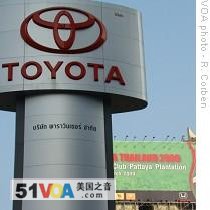Bangkok
19 February 2009
Auto industry executives in Thailand are calling on the government to support the industry, in the face of sharply falling exports and local sales. Layoffs are starting to mount, but analysts are upbeat about the longer term future with more investment - especially from Japan - and the impact of a Thai government economic stimulus package.
 |
| Toyota is a market leader in Thailand |
But with Detroit, itself, in deep financial trouble due, in part, to the financial recession, auto industry executives hope the Thai government will come to the rescue, at least in the short term.
The industry is facing a sharp downturn. Vehicle industry association forecasts expect production to fall by 25 percent in 2009 to slightly over one million units from 1.4 million last year.
In January, alone, production was cut by 40 percent, while domestic sales fell by 30 percent. The Federation of Thai Industries has forecast auto exports to slide by as much as 25 percent this year.
John Bonnell, director of forecasting Asia Pacific for research firm J.D. Power and Associates, says the Thai market was been caught by the global downturn for autos.
"The auto industry is suffering - it may not be suffering as much as we have in other parts of the world, Western world - it is suffering compared with other parts of South East Asia in the more developing markets of India and China," he said.
This week General Motors in Thailand joined other auto makers to say it was laying off almost 800 workers. This follows staff cuts by Toyota Thailand and Mitsubishi. At present most of the layoffs are for temporary or contract labor.
The industry minister has warned over 46,000 auto industry jobs are at risk from redundancy - from an overall work force of 400,000.
The Thai auto industry is dominated by major Japanese manufacturers, led by Toyota. General Motors and Ford have also invested heavily, benefiting from Thailand's labor skill-base and access to markets within the Association of South East Asian Nations.
General Motors Thailand says it's seeking Thai government backing to access finding sources for a $426 million diesel-engine and pick-up truck project.
 |
| Vallo Tiasiri, president of Thailand Automotive Institute |
"The auto industry will try to ask the government to support in stimulating domestic demand because, in the case of exports, it's too big [a problem]. In the case of domestic [markets] we can look for some support in trying to stimulate the domestic demand and keep the people, the manpower, in the industry," he said.
Thailand's economic ministers this week set out a four-year spending program of more than $54 billion to revive the faltering economy. University economic forecasts are warning the economy could contract by one percent in 2009, down from an earlier best of two percent growth.
But Bonnell remains optimistic about the longer term prospects, despite a slide in auto production this year.
He says the industry is looking for more investment in production of smaller, more fuel-efficient vehicles.
"Bright light on the horizon is the development of small cars," he said. "The industry for small cars here in Thailand is several manufacturers who have, in line with government policy, to promote the production of small cars locally - what they call the eco-car programs. There are several manufacturers that have put in place plans to move production here for small cars."
Japan's Nissan recently confirmed plans to transfer production of its key subcompact car to lower-cost Thailand. All output for the vehicle would be shifted to Thailand and then exported to Japan. The Thai Board of Investment has also given approval for production in Thailand of six eco-car projects, including Nissan, Suzuki, Honda, Toyota, Tata and Mitsubishi.
Other analysts are also positive over the medium term. Singapore-based auto-industry consultancy, Frost and Williams, forecast a recovery in local sales by the third quarter of 2009.
BMW Thailand is hoping to avoid layoffs at its Rayong plant. Michael Kordys, BMW Group Thailand president, remains positive over the industry's future.
"Regarding the automotive industry, the slowdown in inevitable," he said. "However, I'm still very confident of the strong foundation for the Thai auto industry. With the right government actions I'm seeing a positive turn coming soon here."
Thailand Automotive Industry's Vallop says the industry is looking to the government to take steps in three areas - tax cuts, easier bank lending and retraining - to ease the industry's short term troubles. He says, after some adjustment, the industry will emerge stronger.
"We are looking from Thailand and we think our situation is better than other [countries]. So, it means we think our competitive [position] will be better to compete in the world market," he said.
Toyota Motor is also pressing the government to support development of hybrid car production by providing tax relief.
The auto sector's proposals are to be presented to a full meeting of economic ministers led by the prime minister, next week.
Given the concerns over further auto sector job layoffs, industry leaders hope calls for support will be greeted favorably by the government.